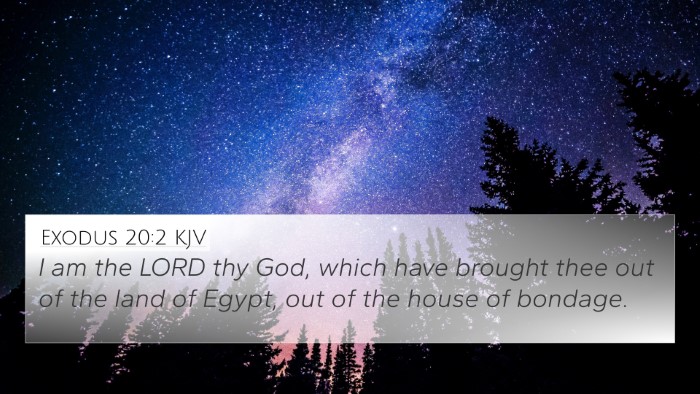Bible Verse Meaning: Leviticus 19:36
Leviticus 19:36 states: "Just balances, just weights, a just ephah, and a just hin, shall ye have: I am the LORD your God, which brought you out of the land of Egypt." This verse highlights the importance of fairness and integrity in commerce and personal dealings.
Commentary Insights:
- Matthew Henry:
Henry emphasizes the principle of honesty in business practices and how God demands justice from His people. The use of varied weights and measures was common in ancient times, often leading to exploitation. This command underscores God's holiness and desire for fairness among His people.
- Albert Barnes:
Barnes relates this commandment to the broader theme of the moral law, connecting it to the idea that God is watching over human interactions. He stresses that God’s presence demands purity not just in worship but in everyday life, ensuring that we act justly in all our transactions.
- Adam Clarke:
Clarke provides a context for this instruction by reminding readers of the covenant relationship between God and Israel. He highlights how this command relates to God’s character, emphasizing that since the Lord liberated them from Egypt, it was their duty to reflect His justice and truth.
Contextual Analysis:
This verse is situated within a chapter that covers various social responsibilities, reinforcing the idea that being a people set apart requires adherence to divine justice. The instructions here are not merely practical; they encapsulate a theological edict regarding how the community should reflect God’s character in all aspects of life.
Cross-Referencing Biblical Texts:
Leviticus 19:36 connects to several other verses, highlighting the importance of justice and fair dealing:
- Proverbs 11:1 - "A false balance is abomination to the LORD: but a just weight is his delight."
- Deuteronomy 25:13-16 - "Thou shalt not have in thy bag diverse weights, a great and a small."
- Micah 6:11 - "Shall I count them pure with the wicked balances, and with the bag of deceitful weights?"
- James 5:4 - "Behold, the hire of the laborers who have reaped down your fields, which is of you kept back by fraud, crieth..."
- Matthew 7:12 - "Therefore all things whatsoever ye would that men should do to you, do ye even so to them..."
- Leviticus 25:14 - "And if thou sell ought unto thy neighbor, or buyest ought of thy neighbor's hand, ye shall not oppress one another."
- Exodus 20:15 - "Thou shalt not steal."
Connections Between Bible Verses:
These verses together paint a comprehensive picture of God’s expectations for justice in human relationships. The consistent emphasis on honesty (e.g., Proverbs 11:1) and the condemnation of deceit (e.g., Micah 6:11) shows the enduring nature of this command across both Old and New Testaments.
Comparative Study and Themes:
In examining Leviticus 19:36 alongside other verses, we see a thematic connection regarding the importance of justice not just as a social necessity but as a reflection of God’s nature. This provides a foundation for a deeper understanding of verses that discuss fairness, justice, and divine expectations.
Tools for Bible Cross-Referencing:
Utilizing tools like a bible concordance or a bible cross-reference guide can enhance study efforts to explore the interconnectedness of scripture. Such resources assist in discovering thematic Bible verse connections and facilitate deeper understanding of how different verses relate to each other.
Practical Application:
Believers today are called to act justly in all dealings, drawing lessons from Leviticus 19:36. This principle extends to all facets of life, including business, personal relationships, and community interactions, reminding us that our actions should align with God's character of justice and righteousness.
Conclusion:
In summary, Leviticus 19:36 serves as an important reminder of the necessity of justice in our dealings with others. By connecting this verse with others throughout scripture, we build a more comprehensive understanding of God's expectations for his people and how to embody those principles in everyday life.






